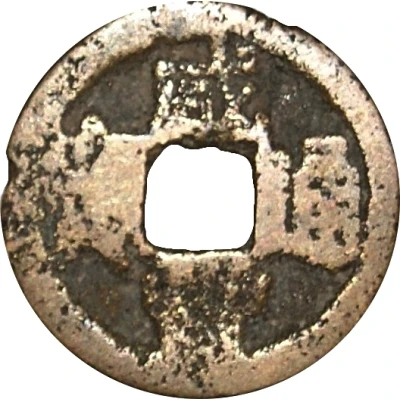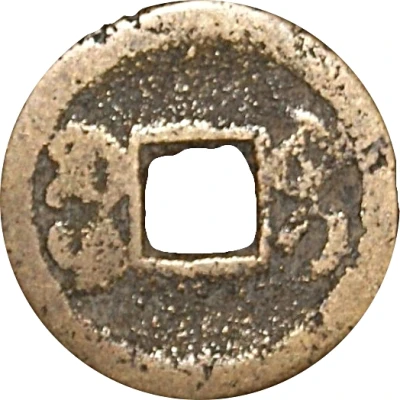1 Cash - Xianfeng Tongbao; Boo-joo; with ideogram ND
| Brass | - | 21 mm |
| Issuer | Empire of China |
|---|---|
| Emperor | Qing dynasty › Xianfeng (咸豐帝) (1850-1861) |
| Type | Standard circulation coin |
| Years | 1851-1861 |
| Value | 1 Cash |
| Currency | Cash (621-1912) |
| Composition | Brass |
| Diameter | 21 mm |
| Shape | Round with a square hole |
| Technique | Cast |
| Orientation | Medal alignment ↑↑ |
| Demonetized | Yes |
| Updated | 2024-10-03 |
| Numista | N#226280 |
|---|---|
| Rarity index | 100% |
Reverse
Two Manchu words (read vertically) separated by the hole, all with one Chinese ideogram above.
Scripts: Chinese (traditional, regular script), Mongolian / Manchu
Lettering:
一
ᠪᠣᠣ ᠵᠣᠣ
Translation:
Yi / Boo-joo
1 Cash / Boo-joo
Edge
Plain
Comment
The exact location of the 'Boo-joo' mint is unknown, although the various types of reverse symbols indicate somewhere around Yunnan, Guizhou, or Sichuan. With many symbols also beeing found on Yunnan-fu or Dongchuan coins, it is possible this is a local mintmark from the Yunnan (similar to Boo-dung).Another Boo-joo was used under Tongzhi, although that mintmark includes a dot. It is possible the dot is correcting the spelling from the Xianfeng coins, or it is an entirely different mint.
Interesting fact
One interesting fact about the Xianfeng Tongbao coin is that it was produced during a time of great economic and political change in China. The Xianfeng Emperor, who ruled from 1850 to 1861, implemented a number of reforms aimed at modernizing China's economy and government, including the introduction of new currency systems. The Xianfeng Tongbao coin was one of the first coins to be produced under this new system, and its design featured a unique ideogram, or character, that represented the emperor's name. This coin is a rare and valuable example of Chinese numismatics and is highly sought after by collectors.

